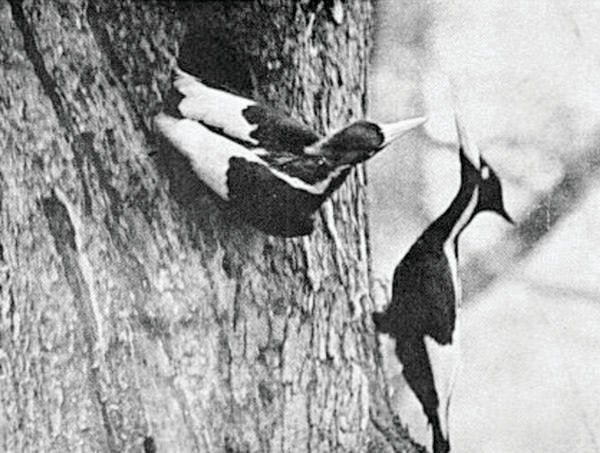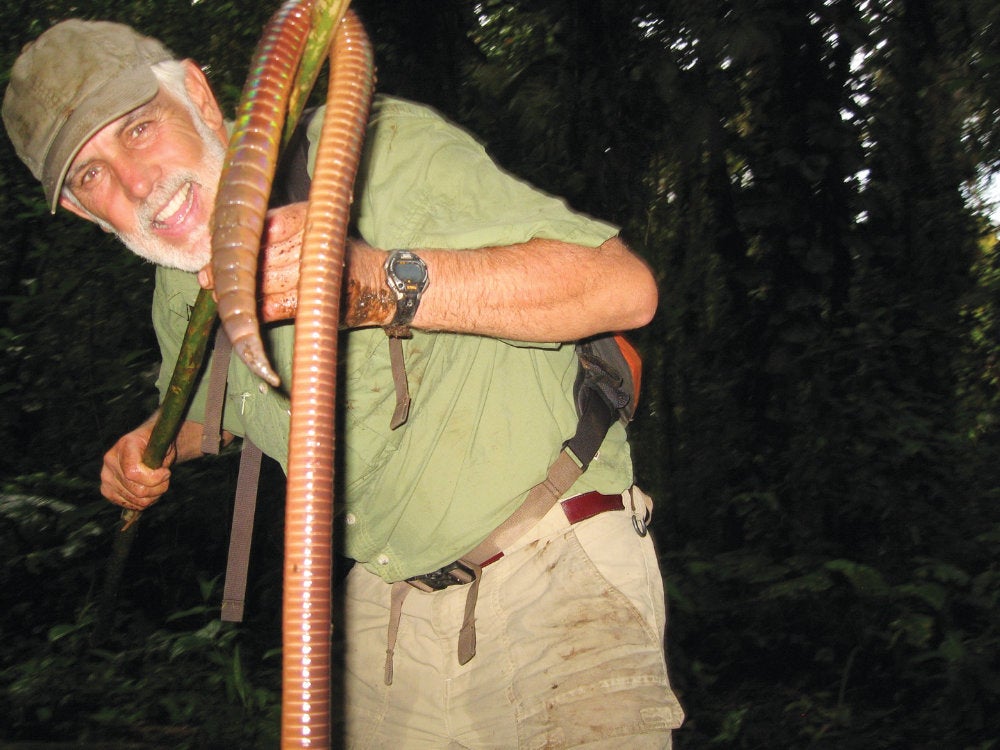
Long on dedication to their studies and short on money and common sense, two URI zoology undergrads head to South Carolina in search of the elusive ivory-billed woodpecker. But things don’t go quite as planned.
Listening to myself I sounded quite unconvincing. I was behind bars and claiming my innocence. Some guy in a suit was flashing his FBI credentials and asking me questions.
It was 1970. I was 20 and had just discovered—the hard way—that they take law and order very seriously in South Carolina. I was in jail on suspicion of bank robbery.
Vertebrate biology was the perfect class for me in the spring semester of my junior year. It was an elective, so it attracted only the hard-core budding zoologists. The prof was a great teacher and a renowned scholar. In class, we delighted in discussions about the realms of man and nature. One discussion was about recent discoveries of animals previously considered extinct. We held a lofty debate on the status of the mysterious ghost bird, the ivory-billed woodpecker. Recent unconfirmed sightings in the forested wetlands of South Carolina had piqued the interest of ornithologists worldwide. To satisfy our curiosity—and seeking an opportunity to make a grand contribution to science—we decided on a class field trip to the swamps over spring break. The University would provide transportation and the prof arranged for us to stay in a biological field station just outside of Aiken.
At 5 a.m. on the appointed day, I was one of 10 students ready to travel and make ornithological history. Then the bad news: The professor’s wife became ill the night before and was in the hospital. Field trip canceled. My lab partner and I looked at one another: “To hell it’s cancelled.” Despite the setback, we would make the trip.
Without the professor, URI would not provide transportation and neither of us owned a car. We would thumb our way south, find the bird, and report back to our classmates.
URI’s proximity to Interstate 95 and some good luck got us to Aiken, South Carolina, in about 14 hours. Arriving at the vacant field station, we found a note tacked to the door welcoming us—their colleagues from URI.
Typically, the biological field station offered the most basic of accommodations. We crashed. The next day, we explored our immediate surroundings and mapped out potential woodpecker habitat. That evening, completely out of food, we hoofed it to a rural village in the nearby outskirts of Aiken, where we found a few houses, one streetlight, a phone booth, and a police substation the size of a large closet.
A brawny policeman stepped out of the closet and asked, “What you boys doin’ here in Aiken?” We told him we were students from URI and that we were there looking for the ivory-billed woodpecker. He invited us in and said he would make a call to someone who might just be able to help us. With the large cop and an oversized desk, the substation was a tight squeeze for the three of us. He spoke to his friend: “We got a couple of Yankees here in my station looking for a bird. Y’all get over here ASAP.” We were impressed. Here was a guy who could call an ornithologist and have them show up at a moment’s notice.
Moments later, two police cars—lights and sirens blazing—skidded into the dirt parking lot. Two of South Carolina’s finest entered the station. Now it was really crowded. One of the newly arrived stated it first, and they all agreed: Yep, we fit the description of the bank robbers.
My buddy and I looked at one another. Not only were Southerners hospitable, they also had a fine sense of humor. So, when they asked me what I had done with the sock I had over my head during the bank robbery, I offered my contribution to the levity: “Well, hell,” I laughed, “It’s back on my foot.”
Whoosh—we were cuffed and tossed into the back of the police car. The humor of the situation deteriorated remarkably when they drove us back to the field station and spent an hour looking for the loot. When we failed to satisfy their repeated demands to disclose the location of the money, they took us to the main police station in Aiken and locked us up.
Round about noon the next day, the FBI guy showed up and we somehow convinced him that we were not bank robbers. He drove us back to the field station to retrieve our stuff and then out to the county line, with this departing advice: “Now, you boys don’t come back, ya hear?”
Somewhere in the dusty archives of the Aiken, South Carolina, police station is my mug shot with the caption, “suspected bank robber.” •
— Stephen Hopkins ’72
Photo: Arthur A. Allen
Editor’s Note: After they were sprung from jail and relocated to the county line, Hopkins and his classmate spent the rest of their spring break mucking around in the bottomlands of the Savannah River ecosystem. He reports that they never found any evidence of the woodpecker, but since unconfirmed sightings of the bird persist, he still ponders the possibility of returning to the scene of his “crime” in search of the ghost bird—and that loot the police were looking for.
About the author
Stephen Hopkins is a lifelong environmental educator whose work has taken him from URI’s W. Alton Jones Campus to California and Ecuador. Pictured here with a giant Sumaco earthworm, the proud father and grandfather says URI provided him “an incredible learning environment, a strong background in the life sciences, and excellent mentors, particularly then-grad students William Bruce Hunter, Ph.D. ’74 (who passed away in 2016) and Robert Guimond ’61, Ph.D. ’70.” Hopkins now lives in the Sierra Nevada mountains near Lake Tahoe in California and “still loves birds and all things wild and free.”


I just finished Stephen Hopkins’ hilarious piece “Field Ornithology and My Life of Crime” in the Fall 2020 issue. Fortunately, other URI students in the early 1970’s had much more positive experiences at the Savannah River Ecology Lab, which as I recall was operated by the University of Georgia. Professors Stan Cobb and Bob Shoop made multiple field trips to the SREL with both undergrad and grad students who were willing and able to go. I should mention that much of the terrain and water available for study was the 310-square mile property of the U.S. Atomic Energy Commission and nuclear materials for bombs were produced in the reactors on-site. Thus, access to the facility was not a given, leading to the attendant “nature sanctuary” feel of the place. On both of my experiences there, we studied PAR Pond (actually a reservoir), which was part of the cooling waterways for the P And R reactors prior to water release to the Savannah River proper. One of my fellow grad students, Torgny Vigerstad, M.S. ’74, Ph.D. ’80, actually did his dissertation research in PAR Pond. In December 1971, as we checked in at the AEC administration building to pick up our badges for the field trip led by Prof. Cobb, many short-haired government employees came out of their offices to behold a couple of the long-haired guys in our group – but I don’t think they ever suspected us of bank robbery.
Dave Bengtson, M.S. ’74, Ph.D. ’82